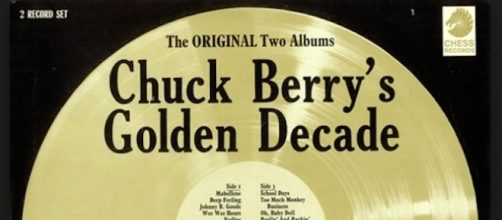Much has been written about Chuck Berry since his death, at age 90, last Saturday: His life story, his influence and importance in the shaping of Rock And Roll music, and tributes by everyone from President Barack Obama to Berry's greatest disciple, Rolling Stones’ guitarist Keith Richards. What follows are my recollections of how I got into Berry’s music, a tale I’m sure is not unlike those of many others.
Beatles' covers
I became a Beatles fan when I was about five years old. I either asked for or bought all of their albums, usually on their original Capitol “rainbow,” or Apple, labels, a few of them in mono.
In the days before social media, before I could drive, or shave, or even stay up late, I would study these labels to try and figure out how the Fab Mop Tops created this magic that brought me so much joy. I wondered if the Richard Penniman listed under “Long Tall Sally” was indeed Little Richard. I may have heard of Carl Perkins, and possibly some of the others, but knew nothing about them.
However, when I realized two of my favorite covers - “Rock and Roll Music” and “Roll Over Beethoven” were credited to Berry, I decided to invest my hard-earned allowance into one of his albums. I particularly loved the subversive humor of the latter, although I would not have identified it as such at the time.
My father loved classical music, and rock music was not taken seriously in those days. “Roll Over Beethoven” was a bit of a dig at the older generation, a funny prelude to Bob Dylan’s “The Times, They Are A-Changin’,” signaling the changing of the guard.
I have no idea how certain facts infiltrated my young brain, but I knew I had to get Berry's original Chess recordings, not the ones later rerecorded for another label. Sometime in the very early 1970s, most likely, I bought "Golden Decade," a two album compilation. There were two possible album covers - one with an old radio, another with a gold record. I chose the latter, because it looked older.
It was love at first listen. Since music, and its accompanying technologies, were moving at lightning speed, the recordings sounded a bit dated at first, but my ears soon acclimated.
It was everything it promised, and more, and it didn’t even include all of his great recordings! Missing in action were “Carol,” “Little Queenie,” “Sweet Little Rock and Roller,” “Let It Rock,” and many others. Those would come later.
Elvis
I couldn’t get into Elvis Presley right away. His music was too studied, his manner too powerful. His most recent records - “In The Ghetto,” “Suspicious Minds" - were for grown ups, and I was still young. Berry’s records were the musical soda fountain of youth, a realistic fantasy we all wanted to believe, a world of cars and girls and jukeboxes and safety belts that wouldn’t budge. Unlike Presley, Berry somehow managed to remain relevant, yet frozen in time.
The hits dried up, he became an oldies acts, but an entire generation missed it the first time around so we lapped it up. We saw him on the cover of "Creem." We watched him jam with John and Yoko on the Mike Douglas show, or "The Tonight Show," when host Johnny Carson bumped all the other guests so Berry could play a third, unrehearsed, number, with Doc Severinsen's big band. (I left a Red Hot Chili Peppers’ club gig to catch the latter.)
As my record collection expanded, so did my collection of Berry covers. The Stones, #Bowie, the Dead, the Stones, the Beach Boys, the Faces, #Springsteen, Lennon, the Stones, all paying tribute to the man who started it all.
Many years ago, a friend of mine related a story about one of those pick-up bands Berry used as he traveled from gig to gig. The only thing he said to anyone in the band that night was to the drummer. At one point, Berry turned around, yelled, “The accent is on the backbeat, mother------!”
Rock in peace, Chuck.

